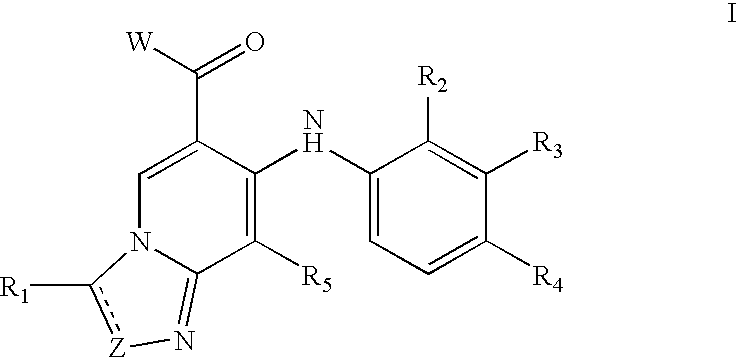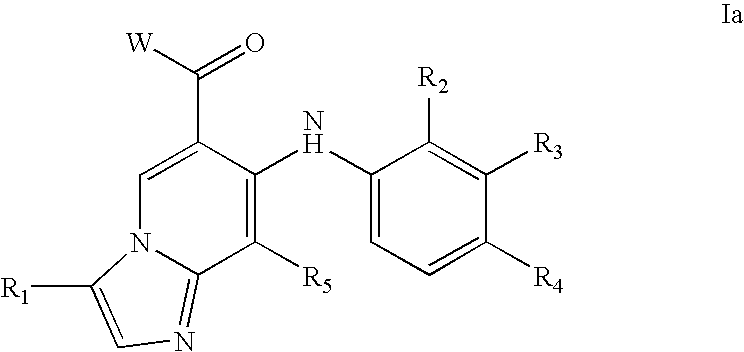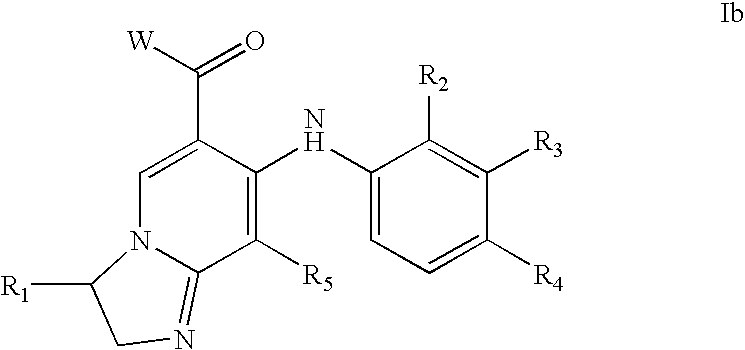Imidazopyridines and triazolopyridines
a technology of which is applied in the field ofimidazopyridine and triazolium pyridine derivatives, can solve the problems of mitogenic signals within the cell, and achieve the effect of reducing the number of mitogenic signals
- Summary
- Abstract
- Description
- Claims
- Application Information
AI Technical Summary
Benefits of technology
Problems solved by technology
Method used
Image
Examples
example 1
7-(2-Fluoro-4-iodo-phenylamino)-imidazo[1,2-a]pyridine-6-carboxylic acid ethyl ester
Step A: Preparation of ethyl 6-chloro-4-(2-fluoro-4-iodoanilino)nicotinate
Ethyl 4,6-dichloronicotinate [prepared according to the literature procedure of J. Chem. Soc. 5163 (1963)] (15.0 g, 68.1 mmol) and 2-fluoro-4-iodoaniline (15.0 g, 63.3 mmol) were dissolved in ethanol (100 mL), to which was added conc. hydrochloric acid (4 drops). This mixture was heated at reflux for 12 h. The solution was allowed to cool to ambient temperature. The resultant solid was slurried with ethanol (50 mL) and was filtered. The filter cake was further washed with ethanol (2×50 mL) and dried in vacuo to give ethyl 6-chloro-4-(2-fluoro-4-iodoanilino)nicotinate (15.88 g, 60% yield): m.p. (EtOAc / n-hexane) 162-164° C. 1H NMR [(CD3)2SO, 400 MHz]δ 9.62 (s, 1H), 8.69 (s, 1H), 7.82 (dd, J=9.9, 1.9 Hz, 1H), 7.61-7.66 (m, 1H), 7.33 (t, J=8.5 Hz, 1H), 6.67 (d, J=1.8 Hz), 4.37 (q, J=7.1 Hz, 2H), 1.35 (t, J=7.1 Hz, 3H). Anal. ...
example 2
7-(2-Fluoro-4-iodo-phenylamino)-imidazo[1.2-a]pyridine-6-carboxylic acid
A solution of 7-(2-Fluoro-4-iodo-phenylamino)-imidazo[1,2-a]pyridine-6-carboxylic acid ethyl ester (160 mg, 0.38 mmol) in tetrahydrofuran (10 mL) was treated with aqueous sodium hydroxide (1.0 N, 0.565 mL, 0.565 mmol). The reaction was stirred overnight at ambient temperature. An additional portion of 1 N sodium hydroxide (0.5 mL, 0.5 mmol) was added and the reaction was stirred an additional 3 h at ambient temperature. The reaction was acidified with aqueous hydrochloric acid (1.0 N, 1.1 mL, 1.1 mmol) and the solvent was evaporated to dryness. The remaining solid was triturated with methanol-ethyl acetate and dried in vacuo to afford 7-(2-Fluoro-4-iodo-phenylamino)-imidazo[1,2-a]pyridine-6-carboxylic acid (150 mg, 100% yield) as a tan-colored solid: 1H NMR (400 MHz, DMSO-d6) δ 9.36 (br s, 1H), 8.03 (d, J=2.0 Hz, 1H), 7.85 (dd, J=10.2, 1.7 Hz, 1H), 7.82 (d, J=2.2 Hz, 1H), 7.67 (dm, J=8.5 Hz, 1H), 7.41 (t, J=8...
example 3
7-(2-Fluoro-4-iodo-phenylamino)-imidazo[1.2-a]pyridine-6-carboxylic acid amide Method A: A solution of 7-(2-Fluoro-4-iodo-phenylamino)-imidazo[1,2-a]pyridine-6-carboxylic acid ethyl ester (172 mg, 0.405 mmol) in ammonia-saturated methanol (10 mL) was heated to 80° C. for 18 h. The cooled reaction mixture was filtered and the tan-colored solid was washed with methanol and dried in vacuo to provide 7-(2-Fluoro-4-iodo-phenylamino)-imidazo[1,2-a]pyridine-6-carboxylic acid amide (86 mg, 54% yield): 1H NMR (400 MHz, DMSO-d6) δ 9.56 (d, J=1.7 Hz, 1H), 8.91 (s, 1H), 8.28 (br s, 1H), 7.79 (br s, 1H), 7.73 (br s, 1H), 7.67 (dd, J=10.7, 2.0 Hz, 1H), 7.51 (d brd, J=8.5, 1.2 Hz, 1H), 7.42 (d, J=1.2 Hz, 1H), 7.38 (t, J=8.5 Hz, 1H), 6.90 (s, 1H); 19F NMR (376 MHz, DMSO-d6) δ−125.6; MS (APCI+) for C14H10FIN4O=396.9 [M+1]. C26ELSA IC50=0.0019 μM.
Method B: A solution of 7-(2-Fluoro-4-iodo-phenylamino)-imidazo[1,2-a]pyridine-6-carboxylic acid (120 mg, 0.30 mmol) in dimethylformamide (2 mL) was trea...
PUM
| Property | Measurement | Unit |
|---|---|---|
| structure | aaaaa | aaaaa |
| concentration | aaaaa | aaaaa |
Abstract
Description
Claims
Application Information
 Login to View More
Login to View More - R&D
- Intellectual Property
- Life Sciences
- Materials
- Tech Scout
- Unparalleled Data Quality
- Higher Quality Content
- 60% Fewer Hallucinations
Browse by: Latest US Patents, China's latest patents, Technical Efficacy Thesaurus, Application Domain, Technology Topic, Popular Technical Reports.
© 2025 PatSnap. All rights reserved.Legal|Privacy policy|Modern Slavery Act Transparency Statement|Sitemap|About US| Contact US: help@patsnap.com



